190. According to the Hindu
nakshatra system also the Orion
constellation had a pair of stations:
|
ARIES: |
|
1 |
Ashvini |
β and γ Arietis |
Horse's head |
April 17 (107) |
|
wife of the Ashvins |
Sheratan and Mesarthim |
|
2 |
Bharani |
35, 39, and 41 Arietis |
Yoni, the female organ of
reproduction |
May 1 (121) |
|
the bearer |
Musca Borealis |
|
TAURUS: |
|
3 |
Krittikā |
M 45 Tauri |
Knife or spear |
May 15 (135) |
|
the nurses of
Kārttikeya |
The Pleiades |
|
4 |
Rohini |
α Tauri |
Cart or chariot,
temple, banyan tree |
May 28 (148) |
|
the red one |
Aldebaran |
|
ORION: |
|
5 |
Mrigashīrsha |
λ, φ¹, and φ²
Orionis |
Stag's head |
June 12 (163) |
|
the deer's head |
Heka |
|
6 |
Ardra |
α Orionis |
Teardrop, diamond,
a human head |
June 17 (168) |
|
the moist one |
Betelgeuze |
There were
163 (June 12) - 107 (April
17) = 8 weeks from the Head
of the Horse to the Head of
the Stag.
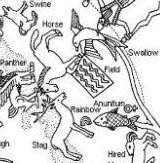
In the C text
there should then be 8 weeks
= 56
glyphs (days) from the beginning
of side b to Heka.
Sheratan (*27) + *56 = *83
(Heka). However there were only 55 days (glyphs) due to
the difference between 366
and 365. The Head of the Fly
came after 11 calendar days instead
of after 12 days:
 |
 |
 |
 |
7 |
|
Cb1-1 (393) |
Cb1-2 |
Cb1-3 |
Cb1-4 (366 + 30) |
|
E tupu - ki
roto |
o te hau tea |
ki te henua -
te maro |
|
CLOSE TO THE
FULL MOON (and
nakshatra
dates): |
|
Al Sharatain-1 /
Ashvini-1 /
Bond-16 (Dog) /
Mahrū-sha-rishu-ku-1
(Front of the
Head of Ku)
SEGIN = ε
Cassiopeia,
MESARTHIM = γ
Arietis,
ψ Phoenicis
(27.2),
SHERATAN
(Pair of Signs)
= β Arietis,
φ Phoenicis
(27.4) |
ι Arietis
(28.0), λ
Arietis (28.2),
υ Ceti (28.8) |
ALRISHA
(The Knot) = α
Piscium,
χ Phoenicis
(29.2),
ALAMAK (Caracal)
= γ Andromedae
(29.7) |
Arku-sha-rishu-ku-2
(Back of the
Head of Ku)
2h (30.4)
κ Arietis
(30.3),
HAMAL
(Sheep) = α
Arietis
(30.5)
ALKES (α
Crateris)
|
|
April 17 (290 -
183) |
18 (108) |
19 (*29) |
4-20 |
 |
 |
 |
 |
34 |
|
Cb1-12 (354
+ 50) |
Cb1-13 |
Cb1-14 (350
+ 8 * 7) |
Cb1-15 (407) |
|
manu rere
- kua rere
ga manu - ki
te ragi |
eaha te
nuku erua |
koia kua
huki |
e niu tu |
|
INVISIBLY
CLOSE TO THE
SUN (helical
dates): |
|
ρ Lupi
(221.0),
TOLIMAN
= α Centauri
(221.2), π
Bootis
(221.8), ζ
Bootis
(221.9) |
31 Bootis
(222.0),
YANG MUN
(South Gate)
= α Lupi
(222.1),
RIJL AL AWWA
(Foot of the
Barker) = μ
Virginis
(222.5), ο
Bootis
(222.9) |
IZAR
(Girdle) = ε
Bootis
(223.0),
109
Virginis,
α
Apodis (No
Feet)
(223.3), μ
Librae
(223.8) |
Al
Zubānā-14a
/
Visakha-16
(Forked) /
Root-3
(Badger)
ZUBEN
ELGENUBI
(Southern
Claw)
= α Librae
(224.2), ξ
Bootis, ο
Lupi (224.5) |
KOCHAB
(Kakkab,
the Star) =
β Ursae Min.
(225.0), ξ
Librae
(225.7) |
|
Oct 28
(301) |
29 |
30 (366 -
63) |
31 (304 = 80
+ *225) |
Nov 1 |
|
17 (260) |
(*222 - *41) |
"Sept 19
(*182) |
20 |
21 (264) |
|
AUG 25 |
26 (*222 -
*64) |
27 (239 =
303 - 64) |
28 (60 +
180) |
29 (241 =
58 + 183) |
|
217 - 218 |
219 |
220 (= 240 -
20) |
221 |
|
CLOSE TO THE
FULL MOON
(and
nakshatra
dates): |
|
ν Arietis
(38.5), δ, ε
Ceti (38.8) |
μ Arietis
(39.4),
HEAD OF THE
FLY
= 35 Arietis
(39.6),
KAFFALJIDHMA
(Part of a
Hand) = γ
Ceti,
θ Persei
(39.8) |
π Ceti, ο
Arietis
(40.0),
ANGETENAR
(Bend in the
River) = τ¹
Eridani,
μ Ceti
(40.2),
RIGHT WING
= 39 Arietis
(40.9) |
Bharani-2
(Yoni) /
Stomach-17
(Pheasant)
π Arietis
(41.2),
MIRAM (Next
to the
Pleiades) =
η Persei
(41.3),
BHARANI
= 41 Arietis
(41.4),
τ² Eridani,
σ Arietis
(41.7) |
TA LING
(Great
Mound)
= τ Persei
(42.4) |
|
28 (118) |
(4 * 29½ +
1) |
April 30 |
May 1 (121) |
2 |
|
"March 18 |
19 (*364) |
3-20 (*365) |
0h (*366) |
"March 22
(*1) |
|
FEBR 23 |
BIS-SEXTUM |
25 (8 * 7 = 120
- 64) |
26 (*343 =
*366 - 23) |
2-27 (2 *
29) |
|
34 - 35 |
36 |
37 = 41 - 4 |
38 = 58 - 20 |
|
399 - 400
(= 35 + 365) |
401 |
402 |
403 = 407
- 4 |
|
The sequence
of heliacal
star dates
in the text
seems here
to make a
jump ahead
with 1
place,
because *366
= 365 + 1
and from
Arcturus,
Syrma (*215)
to Zuben
Elgenubi
(*224) there
were not 9
but 8
glyphs.
Likewise
were there 9
precessional
days from
*32 to *41
(Bharani).
The sky dome
was moving
said Metoro
where the
Full Moon
reached
Mira.
Maeva.
T. 1. Move.
Rangi-maeva
= Moving Sky
(name of a
marae). 2.
Greet,
greeting.
Henry. |
|
...
The leap day
was
introduced
as part of
the Julian
reform. The
day
following
the
Terminalia
(February
23) was
doubled,
forming the
'bis
sextum -
literally
'double
sixth',
since
February 24
was 'the
sixth day
before the
Kalends of
March' using
Roman
inclusive
counting
(March 1 was
the 'first
day').
Although
exceptions
exist, the
first day of
the bis
sextum
(February
24) was
usually
regarded as
the
intercalated
or
'bissextile'
day since
the third
century.
February 29
came to be
regarded as
the leap day
when the
Roman system
of numbering
days was
replaced by
sequential
numbering in
the late
Middle Ages
...
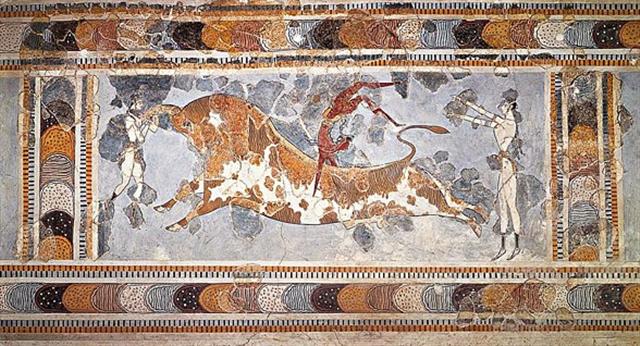 |
 |
 |
 |
 |
 |
|
Cb3-1 (50) |
Cb3-2 (443) |
Cb3-3 |
Cb3-4 (445) |
Cb3-5 (54) |
|
E vae ra
- ka oho -
ki te henua
- kua huki |
ku kikiu -
te henua |
ko te
henua - te
rima |
e kava |
i haga rave
ika |
|
...
Traditionally,
remark, the
kava
root was
chewed to
make the
infusion:
The
sacrificed
child of the
people is
cannibalized
by the young
chiefs. The
water of the
kava,
however, has
a different
symbolic
provenance.
The classic
Cakaudrove
kava
chant,
performed at
the Lau
installation
rites,
refers to it
as sacred
rain water
from the
heavens
... This
male and
chiefly
water
(semen) in
the womb of
a kava
bowl whose
feet are
called
'breasts' (sucu)
.jpg)
and from the
front of
which, tied
to the upper
part of an
inverted
triangle, a
sacred cord
stretches
out toward
the chief
... The cord
is decorated
with small
white
cowries, not
only a sign
of
chieftainship
but by name,
buli leka,
a
continuation
of the
metaphor of
birth -
buli,
'to form',
refers in
Fijian
procreation
theory to
the
conceptual
acception of
the male in
the body of
the woman.
The
sacrificed
child of the
people will
thus give
birth to the
chief. But
only after
the chief,
ferocious
outside
cannibal who
consumes the
cannibalized
victim, has
himself been
sacrificed
by it. For
when the
ruler drinks
the sacred
offering, he
is in the
state of
intoxication
Fijians call
'dead from'
(mateni)
or 'dead
from kava'
(mate ni
yaqona),
to recover
from which
is
explicitly
'to live' (bula). This
accounts for
the second
cup the
chief is
alone
accorded,
the cup of
fresh water.
The god is
immediately
revived,
brought
again to
life - in a
transformed
state ... |
|
INVISIBLY
CLOSE TO THE
SUN NORTH OF
THE EQUATOR: |
|
NODUS I = ζ
Draconis (260.0),
π Herculis
(260.7),
RAS ALGETHI
(Head of the
Giant)
= α Herculis
(260.8) |
SARIN = δ
Herculis
(261.0), ο
Ophiuchi
(261.4)
ALRISHA (α
Piscium) |
ξ Ophiuchi
(262.2), θ
Ophiuchi, ν
Serpentis,
ζ, ι Apodis
(262.4), ι
Arae
(262.8), ρ
Herculis
(262.9) |
β, γ Arae
(263.3), κ
Arae
(263.5), σ
Ophiuchi
(263.6) |
LESATH
(Sting) = ν
Scorpii,
δ Arae
(264.7),
CHOO (Club)
=
α
Arae
(264.9) |
|
Dec 6 (340) |
7 |
8 |
9 |
10 (*264) |
|
ºDec 2 (336
= 2 * 168) |
3 |
4 |
5 |
6 (*260) |
|
'Nov 9 |
10 (314 → π) |
11 |
12 (*236) |
13 |
|
"Oct 30 |
31 (300) |
"Nov 1 |
2 |
3 (*157 =
314 / 2) |
|
OCT 3 (276 =
340 - 64) |
4 |
5 |
6 |
7 (*200) |
|
256 = 340 -
84 |
257 |
258 |
259 |
260 (*180) |
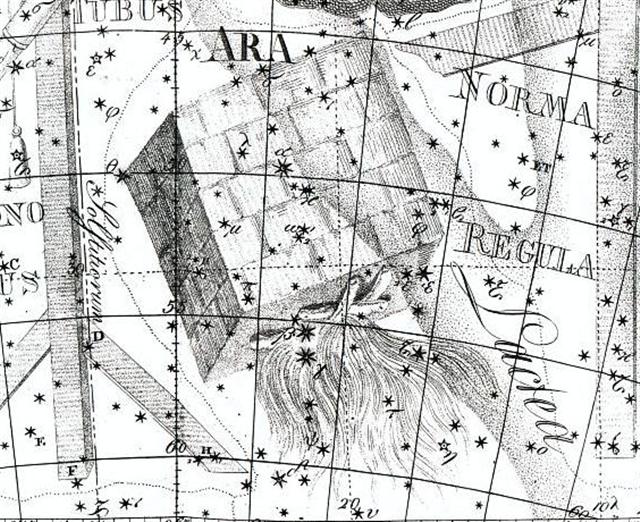 |
|
CLOSE TO THE
FULL MOON
ON EASTER
ISLAND: |
|
μ Aurigae, μ
Leporis
(77.6) |
ĸ Leporis
(78.0),
RIGEL
(Foot) = β
Orionis
(78.1),
Flaming Star
= IC405
(78.2),
CAPELLA
= α Aurigae
(78.4), ο
Columbae, τ
Orionis
(78.8) |
λ Aurigae
(79.0), λ
Leporis
(79.6), ρ
Aurigae
(79.7)
ARCTURUS (α
Bootis) |
Shur-narkabti-sha-iltanu-5
(Star in the
Bull towards
the north)
σ Aurigae
(80.4),
BELLATRIX
(Female
Warrior) =
γ Orionis,
SAIF AL
JABBAR
(Sword of
the Giant) = η
Orionis
(80.7),
ELNATH
= β Tauri
(80.9) |
ψ Orionis
(81.1),
NIHAL
(Thirst-slaking
Camels) = β
Leporis
(81.7) |
|
June 6 |
7 |
8 |
9 |
10 (161) |
|
ºJune 2 |
3 |
4 |
5 |
6 (157 = 80
+ *77) |
|
'May 10
(130) |
11 |
12 |
13 |
14 |
|
"April 26 |
27 |
28 (118 = 4
* 29½) |
29 |
30 (120) |
|
APRIL 3 (93) |
4 |
5 |
6 |
7 |
|
73 (→ π) |
74 |
75 |
76 |
77 (= 260 -
183) |
Or
one could say there
were 12 * 12 = 144
right ascension days from *78 (the
Foot of Orion,
Rigel) to the Foot
of the Barker (μ
Virginis, Rijl al
Awwa, *222).
Cb3-2 (443) - Cb1-12
(404) = 39 (= 3 *
13) = 183 - 144.
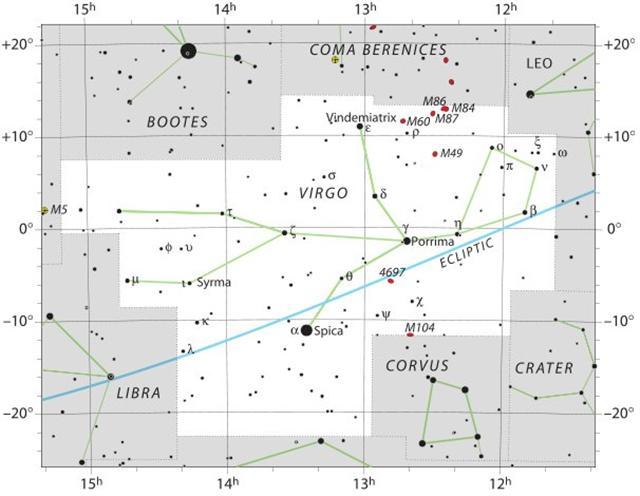
 |
 |
 |
 |
|
Cb3-6 |
Cb3-7 (392 +
56) |
Cb3-8 |
Cb3-9 (450) |
|
ki kikiu
- te henua |
ko te
maro - ko te
tagata
|
kua hua
te tagata |
ko te
tagata |
|
CLOSE TO THE
FULL MOON
ON EASTER
ISLAND: |
|
KHUFU
MINTAKA
(Belt) = δ
Orionis,
υ Orionis
(82.4), χ
Aurigae
(82.5), ε
Columbae
(82.6) |
KHAFRE
Al Hak'ah-3
(White Spot)
/
Mrigashīrsha-5
(Deer's
Head)
/
Turtle
Head-20
(Monkey) /
Mas-tab-ba-tur-tur
(Little
Twins)
ARNEB = α
Leporis,
Crab Nebula
= M1 Tauri
(83.0,
φ¹ Orionis
(83.1),
HEKA
= λ Orionis,
Orion Nebula
= M42
(83.2),
φ² Orionis
(83.6),
ALNILAM
(String of
Pearls) = ε
Orionis
(83.7) |
MENKAURE
Three
Stars-21
(Gibbon) /
Shur-narkabti-sha-shūtū-6
(Star in the
Bull towards
the south) /
ANA-IVA-9
(Pillar of
exit)
HEAVENLY
GATE
= ζ Tauri,
ν Columbae
(84.0), ω
Orionis
(84.2),
ALNITAK
(Girdle) = ζ
Orionis,
PHAKT
(Phaet) = α
Columbae
(84.7) |
ο Aurigae
(85.8), γ
Leporis
(85.9)
YANG MUN (α
Lupi)
|
|
... Al
Maisān,
the title of
γ
Geminorum,
by some
error of
Firuzabadi
was applied
to this star
as Meissa,
and is now
common for
it. Al Sufi
called it
Al Tahāyī;
but Al
Ferghani and
Al Tizini
knew it as
Rās al
Jauzah,
the Head of
the Jauzah,
which it
marks.
The original
Arabic name,
Al Hak'ah,
a White
Spot, was
from the
added faint
light of the
smaller
φ¹and
φ²
in the
background,
and has
descended to
us as
Heka and
Hika.
These three
stars were
another of
the
Athāfiyy
[tripods
used for
cooking] of
the Arabs;
and
everywhere
in early
astrology
were
thought,
like all
similar
groups, to
be of
unfortunate
influence in
human
affairs.
They
constituted
the
Euphratean
lunar
station
Mas-tab-ba-tur-tur,
the Little
Twins, a
title also
found for
γ
and
η
Geminorum;
and
individually
were
important
stars among
the
Babylonians,
rising to
them with
the sun at
the summer
solstice,
and, with
α
and
γ,
were known
as Kakkab
Sar, the
Constellation
of the King
... |
|
June 11 |
12 |
13 (164) |
14 |
|
"May 1 (*41) |
2 |
3 |
4 |
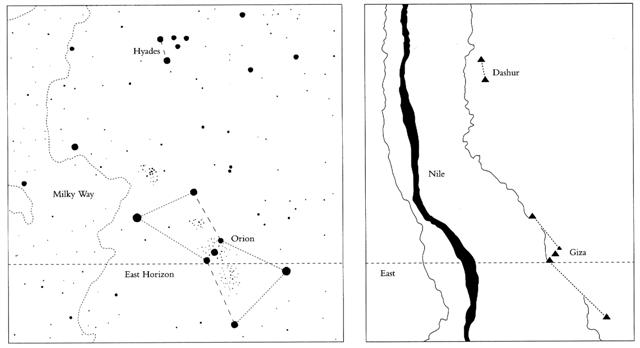
...
Menkaure
was
allegedly a
much more
benevolent
Pharaoh than
his
predecessors.
According to
legends
related by
Herodotus,
he wrote the
following :
This Prince
(Mycerinus)
disapproved
of the
conduct of
his father,
reopened the
temples and
allowed the
people, who
were ground
down to the
lowest point
of misery,
to return to
their
occupations
and to
resume the
practice of
sacrifice.
His justice
in the
decision of
causes was
beyond that
of all the
former
kings. The
Egyptians
praise him
in this
respect more
highly than
any other
monarchs,
declaring
that he not
only gave
his
judgements
with
fairness,
but also,
when anyone
was
dissatisfied
with his
sentence,
made
compensation
to him out
of his own
purse and
thus
pacified his
anger .
The Gods
however
ordained
that Egypt
should
suffer
tyrannical
rulers for a
hundred and
fifty years
according to
this legend.
Herodotus
goes on :
An oracle
reached him
from the
town of
Buto,
which said
'six years
only shalt
thou live
upon this
earth, and
in the
seventh thou
shalt end
thy days'.
Mycerinus,
indignant,
sent an
angry
message to
the oracle,
reproaching
the god with
his
injustice -
'My father
and uncle,'
he said
'though they
shut up the
temples,
took no
thought of
the gods and
destroyed
multitudes
of men,
nevertheless
enjoyed a
long life;
I, who am
pious, am to
die soon!'
There came
in reply a
second
message from
the oracle -
'for this
very reason
is thy life
brought so
quickly to a
close - thou
hast not
done as it
behoved
thee. Egypt
was fated to
suffer
affliction
one hundred
and fifty
years - the
two kings
who preceded
thee upon
the throne
understood
this - thou
hast not
understood
it'.
Mycerinus,
when this
answer
reached him,
perceiving
that his
doom was
fixed, had
lamps
prepared,
which he
lighted
every day at
eventime,
and feasted
and enjoyed
himself
unceasingly
both day and
night,
moving about
in
the
marsh-country
and the
woods, and
visiting all
the places
he heard
were
agreeable
sojourns.
His wish was
to prove the
oracle
false, by
turning
night into
days and so
living
twelve years
in the space
of six
... |
 |
 |
 |
 |
 |
 |
|
Cb3-10 |
Cb3-11 |
Cb3-12 |
Cb3-13 |
Cb3-14 (63) |
Cb3-15 (456) |
|
te
taketake |
henua |
kiore - henua |
manu rere |
tagata - hanau hia |
kiore - henua |
|
CLOSE TO THE
FULL MOON
ON EASTER
ISLAND: |
|
μ Columbae,
SAIPH (Sword) = κ
Orionis
(86.5),
τ Aurigae, ζ Leporis
(86.6) |
υ Aurigae (87.1), ν
Aurigae (87.2),
WEZN (Weight) = β
Columbae,
δ Leporis (87.7),
TZE (Son) = λ
Columbae
(87.9) |
Ardra-6 (Moist One)
/
ANA-VARU-8
(Pillar to sit by)
χ¹ Orionis, ξ
Aurigae (88.1),
BETELGEUZE
= α Orionis
(88.3), ξ Columbae
(88.5), σ Columbae
(88.7)
ZUBEN
ELGENUBI (α Librae) |
η Leporis (89.0),
PRAJA-PĀTI
(Lord of Created
Beaings) = δ
Aurigae, MENKALINAN
(Shoulder of the
Rein-holder) = β
Aurigae, MAHASHIM
(Wrist) = θ Aurigae,
and γ Columbae
(89.3),
π Aurigae
(89.4), η Columbae
(89.7) |
μ Orionis (90.3), χ²
Orionis (90.5) |
ν Orionis (91.4), θ
Columbae (91.5), π
Columbae (91.6)
|
|
5 days |
6h (91.3)
|
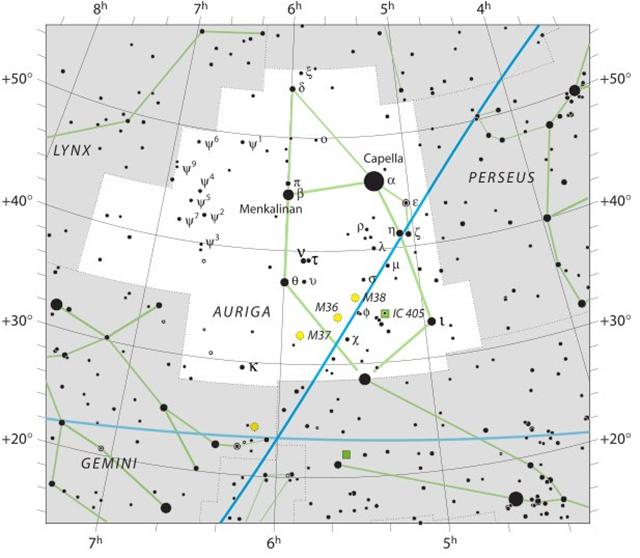
... A vertical line
could be drawn down
from the little star
at the head of the
Charioteer, viz.
Praja-pāti (Lord
of Created Beings,
δ), to Menkalinan
(Shoulder of the
Rein-holder, β), and
to
Mahashim (θ,
Wrist - sic!) - i.e.
they were rising at
the same right
ascension time -
with π Aurigae (the
tiny star just above
Menkalinan) only a
fraction of a day
later.
Further down was the
Pigeon of Noah -
waving her leaves -
with η Columbae, the
star at her right
eye, also rising at
the right ascension
line defined by the
Lord of Created
Beings:
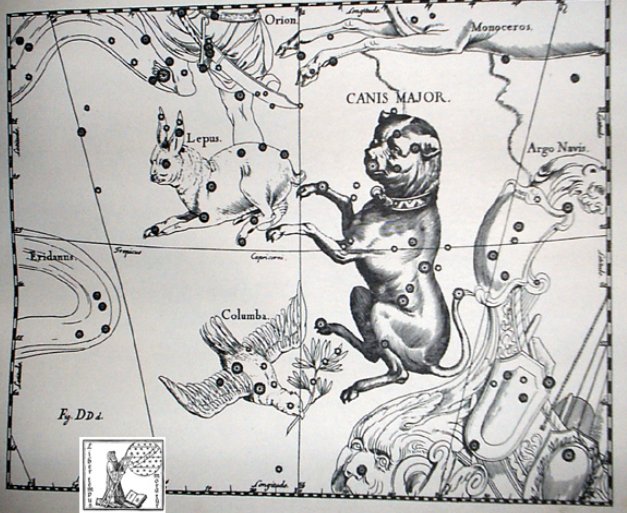
|










.jpg)













